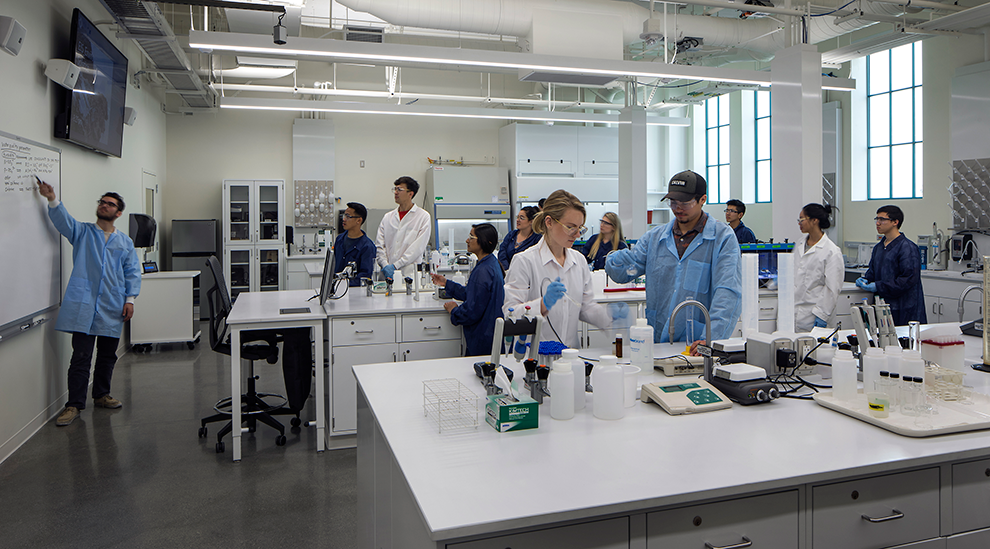Research and Philanthropy: How private support can help fill a gap
The Prebys Foundation kick-started a critical new source of funding for pivotal work in labs and for graduate students.

When the Prebys Foundation announced in May 2025 a $1 million grant to San Diego State University for STEM-focused research, it was like a light switching on in a darkened room.
The investment from one of San Diego’s most prominent philanthropies, founded by a man who modeled his life after that of Andrew Carnegie and whose previous support for SDSU is etched in stone at the entrances to the Conrad Prebys Aztec Student Union, comes amid a turnaround in the historic partnership between federal agencies and the academic institutions that have propelled fundamental and community-driven research in the U.S. since World War II.
At SDSU this work has included transformational work in the field of viromics, the discovery of the first planetary system orbiting two stars, and identification of a protein in the heart that helps cells survive injury and regenerate after damage.
Today, SDSU is among many universities impacted by the reported cancellation or delay of more than thousands of grant awards from the National Institutes of Health, the National Science Foundation and other funding sources. In this new climate the Prebys Foundation characterized its unrestricted grant as “emergency funding,” provided for SDSU in the same issuance of support for such high-powered local biomedical mainstays as the Salk Institute and Scripps Research.
Hala Madanat, SDSU vice president for research and innovation, hopes the fill-in for federal budget cuts can be emulated by other philanthropic sources in support of faculty and their students’ pathway to education and fulfilling careers.
“SDSU has traditionally not relied on philanthropy to sponsor our most vital, cutting-edge research and projects in the San Diego community,” Madanat said. “With what we see happening today, private donors stepping up as the Prebys Foundation did can help ensure that our researchers’ work continues.
“Not only will this help us keep our place among the top research universities in the world,” Madanat added, ”it will support the essential contributions made by talented graduate students who choose SDSU over their many other choices for their master’s or doctoral degree.”
After three straight years of growth SDSU’s research grant funding from all sources was $200.8 million for 2024-25, down 14% from the $229.8 million of the year before, a reverse in a growth trajectory that came from actions in only five months of the federal fiscal year.
Madanat said she expects 2025-26 to be “extremely difficult,” reflecting a national trend, and notes that the downturn comes at a time of a strained state budget for higher education as well.
Critical needs
Known for her own work in NIH-funded public health, Madanat said several critical needs are affected by funding cuts and other policy changes in Washington. Beside support for faculty in their labs, these include doctoral activity, the ability to attract and retain promising researchers from around the world, and perhaps most challenging career-related jobs for graduate students.
“Graduate education is very impacted by the current environment,” Madanat said. “Whether it’s our international students who can’t get visas to come, whether it’s our graduate student fellowships that are being canceled, whether it’s direct student grants for their doctoral programs that are being canceled.
“Those are places where we need support,” Madanat said. “We need to be able to continue the pipeline growth that we’ve been doing for the region and for the State of California.”
It’s part of a bigger picture of advances in science, medicine, and technology that have occurred with the assistance of NIH, NSF and similar agencies: CRISPR gene-editing technology, the internet, mRNA vaccines, medical imaging technologies like MRI and CT scanners, and the development of touchscreens and lithium-ion batteries in smartphones.
“If we believe that the U.S. remains a powerhouse of research and innovation and transformation and impact, then investment in research and innovation needs to continue at an increase, not decrease,” Madanat said. “I think people forget what that means for their day-to-day lives.”
Reflecting the unique relationship between the federal agencies and academic institutions, SDSU in the immediate aftermath of the COVID-19 pandemic received federal support for projects to study increased testing and vaccination in underserved communities, the relationship between COVID and latent TB, and how substance use and HIV may impact COVID infections.
In the new funding landscape, some announced cuts were later rescinded, and SDSU through its Research Foundation has submitted appeals on almost all of the cuts to existing grants, each requiring many hours of work.
Whenever cuts are imposed, however, researchers “have to stop their work….They have to figure out what to do with their students that are funded on these grants,” Madanat said. “They have to figure out what to do with the people that they’re working with in the community.”
An important spinoff effect of the budget cuts centers upon one of SDSU’s priorities, which is recruiting doctoral students. Doctorate production, still largely occurring through joint programs with the University of California system, are one of the two main factors in SDSU’s newly won status as an R1 institution and require a certain minimum number of degrees to be awarded.
“If we have a hard time recruiting doctoral students, if we have a hard time giving them the funding to come to SDSU and do their work with our faculty, I think that’s the place we should be worried about,” said Madanat.
It’s just one of the many ways Madanat and SDSU leaders want to see the university’s research enterprise pay off.
“This is the time for research and innovation,” Madanat said. “This is the time to support the students’ learning and becoming the best future pipeline of workers, of innovators, of researchers, of scientists that this country needs to continue its global competitiveness.”
To contribute to student learning, research and innovation, please visit our online giving portal or contact Mary Darling, [email protected].



